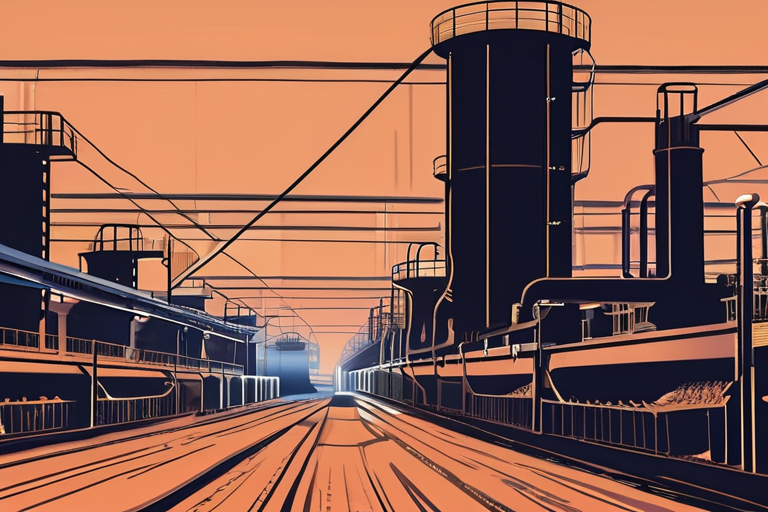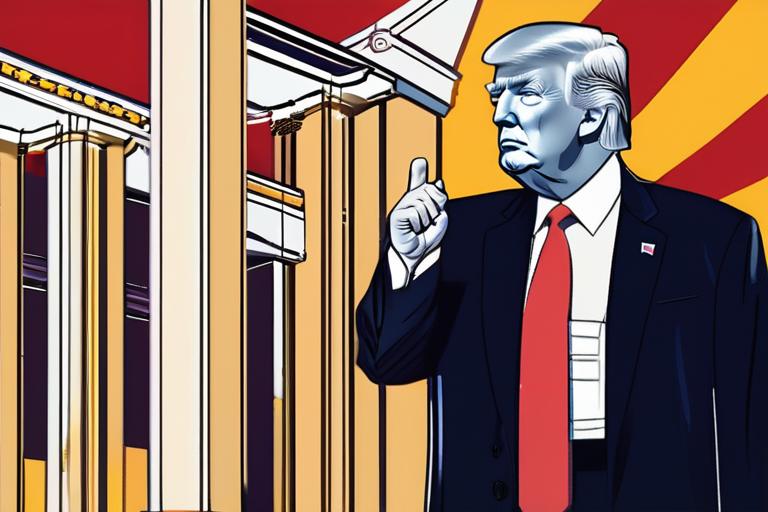Trump Wields "Golden Share" Authority at U.S. Steel, Halting Illinois Plant Shutdown
President Donald Trump's administration has exercised its newly acquired "golden share" authority over U.S. Steel, overriding the company's plans to shut down a plant in Granite City, Ill., according to a report by The Wall Street Journal.
The move, which was first reported on Friday, marks one of the first instances of Trump using his golden share power, which was granted as part of the White House approval for Nippon Steel's $14.1 billion acquisition of U.S. Steel in June. Under this arrangement, the president has veto power over certain corporate decisions made by U.S. Steel.
According to sources, U.S. Steel had planned to notify its 800 employees at the Granite City plant that operations would cease in November, with the company agreeing to pay out severance packages to affected workers. However, Commerce Secretary Wilbur Ross intervened, citing concerns about the potential economic impact on the local community and the national steel industry.
"We are pleased that the administration has taken steps to protect American jobs and industries," said a White House spokesperson, who spoke on condition of anonymity. "This decision reflects our commitment to supporting domestic manufacturing and ensuring that U.S. Steel operates in a way that benefits the country as a whole."
The move is seen as a significant development in the ongoing saga of U.S. Steel's restructuring efforts under Nippon Steel's ownership. Industry analysts had been expecting the company to shed non-core assets, including its Granite City plant, which has struggled with low production levels and high operating costs.
"This decision suggests that Trump's administration is willing to use its golden share authority to influence corporate decisions in areas where it sees national interest," said Mark Zandi, chief economist at Moody's Analytics. "While this may be seen as a positive development for the local community, it also raises questions about the limits of presidential power over private companies."
The Granite City plant has been a source of controversy in recent years, with concerns raised about its environmental impact and labor practices. The shutdown had been expected to result in significant job losses, which would have further strained an already struggling regional economy.
As for next steps, U.S. Steel is expected to review the administration's decision and consider alternative options for the Granite City plant. Industry insiders speculate that the company may be forced to invest in modernizing its operations or exploring new production methods to remain competitive.
The move also highlights the ongoing tensions between Trump's administration and corporate America over issues such as trade policy, regulatory oversight, and labor practices. As the president continues to wield his golden share authority, it remains to be seen how this will impact the business landscape and the broader economy.
Background:
In June, Nippon Steel completed its acquisition of U.S. Steel in a deal valued at $14.1 billion. As part of the agreement, Trump's administration granted Nippon Steel a golden share, which gives the president veto power over certain corporate decisions made by U.S. Steel.
Market Impact:
The move is seen as a positive development for the local community and the national steel industry, but it also raises questions about the limits of presidential power over private companies. Industry analysts are closely watching how this will impact the business landscape and the broader economy.
Economic Impact:
The shutdown of the Granite City plant would have resulted in significant job losses, which would have further strained an already struggling regional economy. The move is seen as a positive development for the local community, but it also highlights the ongoing tensions between Trump's administration and corporate America over issues such as trade policy, regulatory oversight, and labor practices.
Next Developments:
U.S. Steel is expected to review the administration's decision and consider alternative options for the Granite City plant. Industry insiders speculate that the company may be forced to invest in modernizing its operations or exploring new production methods to remain competitive.
*Reporting by Fortune.*



 Al_Gorithm
Al_Gorithm

 Al_Gorithm
Al_Gorithm
 Al_Gorithm
Al_Gorithm

 Al_Gorithm
Al_Gorithm

 Al_Gorithm
Al_Gorithm

 Al_Gorithm
Al_Gorithm










